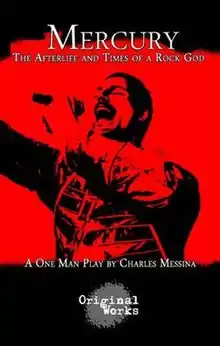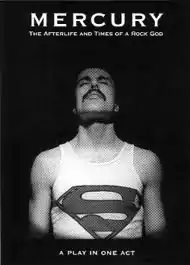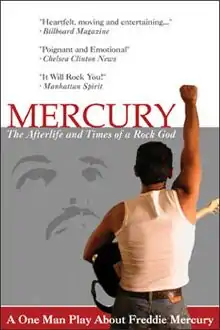Mercury: The Afterlife and Times of a Rock God
Mercury: The Afterlife and Times of a Rock God is a monodrama written by Charles Messina about the life and death of Queen lead singer Freddie Mercury. It presents Mercury in the moments just after his death, during which he is confronted with self-examination as he "seeks redemption before a God unimpressed by his celebrity."[1]
| Mercury: The Afterlife and Times of a Rock God | |
|---|---|
 Front cover of the first published edition of the play | |
| Written by | Charles Messina |
| Characters | Freddie Mercury |
| Date premiered | November 24, 1997 |
| Place premiered | Sanford Meisner Theatre New York, NY |
| Original language | English |
| Genre | Monodrama |
| Setting | A room |
Synopsis
Farrokh Bulsara was a boy of Persian heritage who never quite fit into his skin or his teeth. It wasn’t until he became a young man that he discovered his talent and true nature, and was reborn as Freddie Mercury. After a brilliant career, with the arenas empty and the lights out, on the night of November 24, 1991, Freddie is forced to surrender his celebrity and face the frailty of his own humanity. As he succumbs to AIDS, the worldwide icon seeks redemption before a God unimpressed with celebrity. In his ultimate struggle to make sense of his grim fate, Mercury realizes that his fame, fortune, and talents are no longer enough to sustain him; that beyond the darkness of his fears, shines a light far brighter than the star he was on Earth.[2]
Premiere
 Promotional postcard for the second run of Mercury: The Afterlife and Times of a Rock God |
The play debuted at the Sanford Meisner Theatre in New York City's Chelsea district on November 24, 1997 at 6:48pm - the 6th anniversary of Mercury's death.[3] The part of Freddie was played by Khalid Gonçalves (né Paul Gonçalves).[4]
On opening night of the play, then-New York City Council member Tom Duane introduced the show.[4]
The play ran every night until December 7.
Second run
The play began its second run on February 14, 1998.
On February 17, rock musician Billy Squier, a longtime friend of Freddie's, debuted a song that he wrote in memory of him titled I Have Watched You Fly on stage before a performance of the play. He introduced the song by saying, "I knew Freddie as a friend. I'm honored to share the stage with him in the afterlife."[5]
The play was also performed every night during the second run, ending on March 8, 1998.
Proceeds from the ticket sales of both runs were donated to Gay Men's Health Crisis and The Mercury Phoenix Trust.[4]
Revival and tour
 Promotional postcard for the third run of Mercury: The Afterlife and Times of a Rock God |
On January 11, 2004, the play experienced a successful revival with a three-month run at the Triad Theater, also in New York City, with Messina again as writer/director and featuring Amir Darvish in the role of Freddie.[6]
In 2006, the play also had a special, limited engagement from August 30 to September 2 at The Art House in Provincetown, Massachusetts.[7]
Publication
In 2009, the play was published by Original Works Publishing. Proceeds from the sale of the play will be donated to AmfAR, The Foundation for AIDS Research.[8]
Reviews
Both incarnations of the play have received favorable reviews from Queen fans and from the music and theater press, notably Billboard,[9] The New Yorker,[10] Time Out New York, Zagat Survey,[11] and Backstage.[12]
On November 26, 2011, the play was recognized by Flavorwire.com in their list of 15 Artistic Tributes to Freddie Mercury.[13]
Controversy
There was no Queen or Freddie Mercury music in the play.
In a 1997 interview with Playbill.com, Gonçalves said, "All the things I've seen about Mercury focus on the music, career and persona; very little has been discussed about the person. Not only did Charles write a play about Mercury, he captured the humanity." "Charles and I agreed that doing a musical about Mercury would take away from what we're trying to do in getting to the core of this person. The ultimate goal is to make a film of Mercury's life."[4]
Likewise, Darvish, in a 2004 interview with Access Hollywood, stated that, "We wanted to stray away from the music. We wanted to tell his story. He has a story. Everyone knows the music. People are familiar with the music. It's his story, and where he's come from, and what he's done that people don't know.[14]
Milestone
Mercury: The Afterlife and Times of a Rock God marked the first time the life of Freddie Mercury had been presented in a theatrical form.
A film version of the play is currently in development.
References
- Messina, Charles (2009). Mercury: The Afterlife and Times of a Rock God. United States: Original Works Publishing. pp. back cover. ISBN 978-1-934962-52-7.
- http://www.originalworksonline.com/store/monologues/mercury-the-afterlife-and-times-of-a-rock-god/%5B%5D
- "BBC On This Day: 24 November 1991: Giant of rock dies". BBC News. November 24, 1991.
- Lefkowitz, David (November 24, 1997). "Freddie Mercury To Rise Again, Off-B'way, Nov. 24". Playbill.com. Archived from the original on October 21, 2012.
- Barron, James; Martin, Douglas (February 18, 1998). "PUBLIC LIVES; Theater Records". The New York Times.
- Simonson, Robert (January 11, 2004). "Bohemian Rhapsody: Freddy Mercury Play Begins Performances Off Broadway, Jan. 11". Playbill.com. Archived from the original on October 21, 2012.
- "Mercury: The Afterlife and Times of a Rock God in Provincetown Art House August 30". ProvincetownJournal.com. May 21, 2006.
- Messina, Charles (2009). Mercury: The Afterlife and Times of a Rock God. United States: Original Works Publishing. p. 1. ISBN 978-1-934962-52-7.
- Marone, Mark (December 13, 1997). "On Stage". Billboard. p. 46.
- The New Yorker. January 26, 2004. p. 11. Missing or empty
|title=(help) - Zagat Survey New York City Theater Guide Spring Edition. Zagat Survey. 2004. ISBN 978-1-57006-587-3.
- Forbes, Harry (November 28, 2003). "Mercury: The Afterlife and Times of a Rock God". Backstage.
- Temple, Emily (November 26, 2011). "The Show Must Go On: 15 Artistic Tributes to Freddie Mercury". FlavorWire.com.
- "Mercury: The Afterlife and Times of a Rock God". Access Hollywood. United States. February 2004. 3:00 - Full interview, :30 - final aired segment minutes in. NBC.